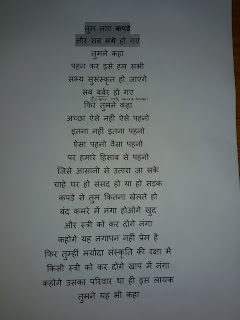Modernist Poems Short But Dramatic
Modernist Poems of selected poets are analyzed here. Poets have written short poems but very dramatic. Means they are very much effective. Let's see one by one.
Once, in finesse of fiddles found I ecstasy,
In a flash of gold heels on the hard pavement.
Now see I
That warmth’s the very stuff of poesy.
Oh, God, make small
The old star-eaten blanket of the sky,
That I may fold it round me and in comfort lie.
In a flash of gold heels on the hard pavement.
Now see I
That warmth’s the very stuff of poesy.
Oh, God, make small
The old star-eaten blanket of the sky,
That I may fold it round me and in comfort lie.
By T. E. Hulme (1883-1917)
First, a short paraphrase of the poem: on London’s Embankment (an area
well-known for homeless people sleeping rough), a ‘fallen gentleman’
reflects on his past and how he found pleasure in worldly social
activities (the ‘finesse of fiddles’ suggesting musical gatherings, such
as dances) and beautiful women – probably (given the ‘flash of gold
heels on the hard pavement‘) courtesans or prostitutes. But now, down on his luck and
most probably sleeping rough on the streets, he realizes that warmth is
what really matters and is what poets should be singing about. The poem
then ends with a heartfelt entreaty to the heavens, with the poem’s
speaker beseeching God to make a blanket of the starry sky so that the
speaker’s wish for warmth might be granted.
2. Darkness
Darkness.I stop to watch a star shine in the boghole –
A star no longer, but a silver ribbon of light.
I look at it, and pass on.
By Joseph Campbell
Analysis: Poet says that Darkness is itself symbolic. In one's life and out of one's life. We found some illusion in darkness as he (poet) has the same. As he passed from the street he found a star in a boghole!! He went nearer and saw that it was not a star but only a silver ribbon of light.
3. Images
Forsaken lovers,
Burning to a chaste white moon,
Upon strange pyres of loneliness and drought.
By Edward Storer
Analysis: Poet is describing here the condition of forsaken lovers. Generally in love both gets calmness through the light of moon. But for them who are forsaken, moon light is like a burning chaste. And it seems that lovers are burning on pyres of lonliness and drought not of wood.
4. In The Station of The Metro
THE apparition of these faces in the crowd;
Petals on a wet, black bough.
By Ezra Pound
Analysis: As the petals on black bough is not live even it is wet. The same situation is happening with all men. Who are habituated to work daily without any feeling or expression. Crowd has no face of feeling that seems to be true here.
5. The Pool
Burning to a chaste white moon,
Upon strange pyres of loneliness and drought.
By Edward Storer
Analysis: Poet is describing here the condition of forsaken lovers. Generally in love both gets calmness through the light of moon. But for them who are forsaken, moon light is like a burning chaste. And it seems that lovers are burning on pyres of lonliness and drought not of wood.
4. In The Station of The Metro
THE apparition of these faces in the crowd;
Petals on a wet, black bough.
By Ezra Pound
Analysis: As the petals on black bough is not live even it is wet. The same situation is happening with all men. Who are habituated to work daily without any feeling or expression. Crowd has no face of feeling that seems to be true here.
5. The Pool
Are you alive?
I touch you.
You quiver like a sea-fish.
I cover you with my net.
What are you—banded one?
By H.D.
Analysis: As a bi-sexual person, Doolittle faced just such a situation. She played
many roles; but, ultimately, she became a many faceted person.
Sometimes, we have difficulty, especially as adolescents, understanding
our feelings. We do not know what our emotions mean. We question who
we are and what we want from life. It might be satisfying to have
someone pull us close and help us to understand as the poet says in the
last line: "What are you-banded one?"
6. Insoucians
IN and out of the dreary trenches,
Trudging cheerily under the stars,
I make for myself little poems
Delicate as a flock of doves.
They fly away like white-winged doves.
By Richard Aldington
Analysis: Poems can not fly but here poet says he has made poems that can fly away like white-winged doves. It looks he want to be free.
They are rattling breakfast plates in basement kitchens,
And along the trampled edges of the street
I am aware of the damp souls of housemaids
Sprouting despondently at area gates.
The brown waves of fog toss up to me
Twisted faces from the bottom of the street,
And tear from a passer-by with muddy skirts
An aimless smile that hovers in the air
And vanishes along the level of the roofs.
By T.S.Eliot
Analysis:
The poem is a set of
striking images of poverty; the poet says nothing but shows them. The
poor people are rattling (making sound) breakfast plates early in the
morning. It is an obligation for poor people to go to work early and
work till late. Sun or shower, frost or fog, they have to set out
early. The image brings to mind similar images of poverty. The
speaker says that he is aware of the condition of the households'
minds and souls, or their psychology. He doesn't describe that. Such
housemaids are appearing one after another at the city gate. Maybe
they come from villages. They have no identity, dignity and
meaningful life. They are 'despondent', or extremely sad.
The
poem is a set of striking images of poverty; the poet says nothing but
shows them. The poor people are rattling (making sound) breakfast plates
early in the morning. It is an obligation for poor people to go to work
early and work till late. Sun or shower, frost or fog, they have to set
out early. The image brings to mind similar images of poverty. The
speaker says that he is aware of the condition of the households' minds
and souls, or their psychology. He doesn't describe that. Such
housemaids are appearing one after another at the city gate. Maybe they
come from villages. They have no identity, dignity and meaningful life.
They are 'despondent', or extremely sad. - See more at:
http://www.bachelorandmaster.com/britishandamericanpoetry/morning-at-the-window.html#.V6xdUY-Kg8o
The
poem is a set of striking images of poverty; the poet says nothing but
shows them. The poor people are rattling (making sound) breakfast plates
early in the morning. It is an obligation for poor people to go to work
early and work till late. Sun or shower, frost or fog, they have to set
out early. The image brings to mind similar images of poverty. The
speaker says that he is aware of the condition of the households' minds
and souls, or their psychology. He doesn't describe that. Such
housemaids are appearing one after another at the city gate. Maybe they
come from villages. They have no identity, dignity and meaningful life.
They are 'despondent', or extremely sad. - See more at:
http://www.bachelorandmaster.com/britishandamericanpoetry/morning-at-the-window.html#.V6xdUY-Kg8o
so much depends
upon
a red wheel
barrow
glazed with rain
water
beside the white
chickens.
By William Carlos Williams
Analysis: Three images are involved: the wheelbarrow, described simply as red,
the qualifying adjectival phrase “glazed with rain/ water,” which
relieves the excessive severity of the second stanza, and the
contrasting white chickens of the final stanza. The first line is
colloquial and open in its invitation; the second line, the preposition
“upon,” prepares the reader for the specifics to follow. Each two-line
stanza has two stressed syllables in the first line and one in the
second, and yet there is lively variation in where the stresses fall.
9. Anecedote of the Jar
I placed a jar in Tennessee,
And round it was, upon a hill.
It made the slovenly wilderness
Surround that hill.
The wilderness rose up to it,
And sprawled around, no longer wild.
The jar was round upon the ground
And tall and of a port in air.
It took dominion everywhere.
The jar was gray and bare.
It did not give of bird or bush,
Like nothing else in Tennessee.
By Wallace Stevens
Analysis:
Anecdote of the Jar
is an imagist poem in which Stevens explores the question of the
superiority between art and nature: Is nature superior to human
creations, or does human creativity surpasses nature in some way?
This is an age-old and puzzling question. This poem solves the riddle
by recognizing the unique differences between art and nature: art may
sometimes be more beautiful than nature but it cannot be as creative
as the nature.
Anecdote
of the Jar is an imagist poem in which Stevens explores the question of
the superiority between art and nature: Is nature superior to human
creations, or does human creativity surpasses nature in some way? This
is an age-old and puzzling question. This poem solves the riddle by
recognizing the unique differences between art and nature: art may
sometimes be more beautiful than nature but it cannot be as creative as
the nature.
- See more at:
http://www.bachelorandmaster.com/britishandamericanpoetry/anecdote-of-the-jar.html#.V6xez4-Kg8o
Anecdote
of the Jar is an imagist poem in which Stevens explores the question of
the superiority between art and nature: Is nature superior to human
creations, or does human creativity surpasses nature in some way? This
is an age-old and puzzling question. This poem solves the riddle by
recognizing the unique differences between art and nature: art may
sometimes be more beautiful than nature but it cannot be as creative as
the nature.
- See more at:
http://www.bachelorandmaster.com/britishandamericanpoetry/anecdote-of-the-jar.html#.V6xez4-Kg8o
l(a
le
af
fa
ll
s)
one
l
iness
By E. E. Cummings
Analysis: The image of a single falling leaf is a common symbol for loneliness, and that this sense of loneliness is enhanced by the structure of the poem. He writes that the fragmentation of the words "illustrates visually the separation that is the primary cause of loneliness". The fragmentation of the word loneliness is especially significant, since it highlights the fact that that word contains the word one. In addition, the isolated letter l can initially appear to be the numeral one. It creates the effect that the leaf is still one, or "oneliness" whole within itself, even after it is isolated from the tree.
Analysis: The image of a single falling leaf is a common symbol for loneliness, and that this sense of loneliness is enhanced by the structure of the poem. He writes that the fragmentation of the words "illustrates visually the separation that is the primary cause of loneliness". The fragmentation of the word loneliness is especially significant, since it highlights the fact that that word contains the word one. In addition, the isolated letter l can initially appear to be the numeral one. It creates the effect that the leaf is still one, or "oneliness" whole within itself, even after it is isolated from the tree.
Thank You
Note:Images are symbolic













Nicely written with appropriate images.
ReplyDelete